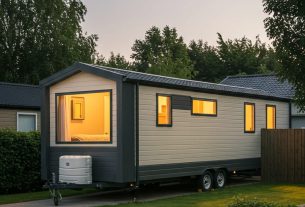When I first began to explore the world of mobile homes, I was struck by their affordability compared to traditional houses. But why exactly are mobile homes so cheap? Is it merely a matter of size, or are there deeper reasons at play? In this article, I’ll dive into the surprising truths behind the low cost of mobile homes and share insights that might change your perspective on this often-overlooked housing option.
The Allure of Affordability
One of the first things that drew me to mobile homes was their price tag. I found it remarkable that many mobile homes are available for a fraction of the cost of a conventional home. As I began to research further, I uncovered several factors that contribute to this affordability:
- Lower Construction Costs: Mobile homes are typically constructed in factories, allowing for mass production which reduces the overall cost.
- Smaller Size: Most mobile homes are smaller than traditional homes, which naturally lowers the price.
- Land Ownership: Many mobile home buyers do not purchase the land on which their home sits, further reducing the upfront costs.
- Financing Options: The financing options available for mobile homes are often less stringent, making them accessible to a broader range of buyers.
Understanding the Mobile Home Market
To truly grasp why mobile homes are cheap, I had to delve into the intricacies of the mobile home market itself. Here are some key insights I discovered:
1. Market Demand and Supply
The market for mobile homes is often driven by demand from individuals seeking affordable housing options. In many areas, the supply of affordable housing is limited, leading to a heightened interest in mobile homes. This demand, coupled with the efficient manufacturing processes, keeps prices low.
2. Depreciation of Value
Unlike traditional homes, which often appreciate in value over time, mobile homes typically depreciate. This depreciation can be attributed to several factors:
- Land Ownership: As mentioned earlier, many mobile homes are not sold with the land. This lack of ownership can lead to depreciation in value.
- Regulations and Zoning Laws: Local regulations can affect where mobile homes can be placed, limiting their market appeal.
- Quality of Construction: While many mobile homes are well-built, some may not stand the test of time, leading to reduced resale value.
The Value Proposition of Mobile Homes
Despite their low price point, mobile homes offer a unique value proposition that many buyers might overlook. Here are some benefits that I believe make mobile homes an attractive option:
1. Affordability in a High-Cost Market
In an era where housing prices are skyrocketing, mobile homes provide a viable alternative for individuals and families looking to own property without breaking the bank. According to the U.S. Census Bureau, the median price for a manufactured home is significantly lower than that of a site-built home, making them an accessible choice for many.
2. Flexible Living Options
Mobile homes can be placed in various locations, from established parks to private lots. This flexibility allows for a lifestyle that can adapt to different needs, whether it’s downsizing, relocating for a job, or seeking a vacation home.
3. Community Living
Many mobile home parks foster a sense of community that can be appealing to new residents. Living in such environments can provide social interaction and support, which are invaluable for overall well-being.
Challenges and Misconceptions
As I navigated through the world of mobile homes, I also encountered various challenges and misconceptions that potential buyers should be aware of:
1. Stigma Surrounding Mobile Homes
There is often a stigma attached to mobile homes, with some perceiving them as inferior housing options. This negative perception can impact resale value and community acceptance. However, many mobile homes are modern, stylish, and well-equipped.
2. Financing Challenges
While financing for mobile homes can be more accessible in some cases, it can also be challenging. Many lenders consider mobile homes personal property rather than real estate, which can lead to higher interest rates and less favorable loan terms.
3. Maintenance and Upkeep
Mobile homes require regular maintenance just like traditional homes. Buyers must be prepared for upkeep tasks, which can sometimes be overlooked due to their lower initial cost.
Real-Life Case Studies
To provide a clearer picture of the mobile home landscape, I looked into various case studies that illustrate the benefits and challenges faced by mobile home owners:
Case Study 1: The Smith Family
The Smiths, a family of four, decided to purchase a mobile home after struggling to find affordable housing in their desired location. They purchased a spacious three-bedroom mobile home in a well-managed park. With the money saved, they invested in their children’s education and built a savings fund. Their experience highlights how mobile homes can provide financial relief and stability.
Case Study 2: The Johnsons’ Investment
On the other hand, the Johnsons purchased an older mobile home as an investment property. They faced significant challenges, including high maintenance costs and difficulties in securing financing. Eventually, they chose to renovate the home, which increased its value and allowed them to rent it out at a competitive rate. Their story underscores the potential rewards of investing in mobile homes, despite the initial hurdles.
Statistics That Make You Think
As I compiled my research, I came across several statistics that further illustrate the mobile home market:
- According to the U.S. Department of Housing and Urban Development, manufactured homes account for over 6% of the nation’s housing stock.
- Mobile homes can be 20-60% cheaper per square foot than traditional homes, depending on the region.
- The average price of a new manufactured home is around $100,000, compared to the national median home price of over $300,000.
Conclusion: The Surprising Truth About Mobile Homes
As I wrap up my exploration of why mobile homes are comparatively cheap, it’s clear that a combination of factors contributes to their affordability. From lower construction costs to market demand, these homes offer a unique solution for those seeking budget-friendly housing options. However, potential buyers must also navigate the challenges and misconceptions surrounding mobile homes.
Ultimately, my journey has led me to appreciate mobile homes as a legitimate housing option that deserves more recognition. If you’re considering a mobile home, weigh the pros and cons carefully, and don’t let stereotypes cloud your judgment.
FAQ
Are mobile homes a good investment?
Mobile homes can be a good investment, especially if you plan to live in one long-term or if you purchase an older model to renovate and rent out. However, consider the potential for depreciation and ensure you have a plan for maintenance and upkeep.
How do I finance a mobile home?
Financing options include personal loans, chattel loans, and FHA loans. Research different lenders and understand their terms, as they can vary significantly.
What are the benefits of living in a mobile home park?
Living in a mobile home park can provide a strong sense of community, often with shared amenities and support systems. It can also be a more affordable option than purchasing land.
If you found this article insightful, I encourage you to share it with friends and on social media. Let’s spread the word about the surprising truths of mobile homes! And don’t forget to sign up for our newsletter for more articles like this. Your thoughts and feedback are always welcome!
Auto Amazon Links: No products found.

Sign up for our newsletter and stay up to date with exclusive news
that can transform your routine!




